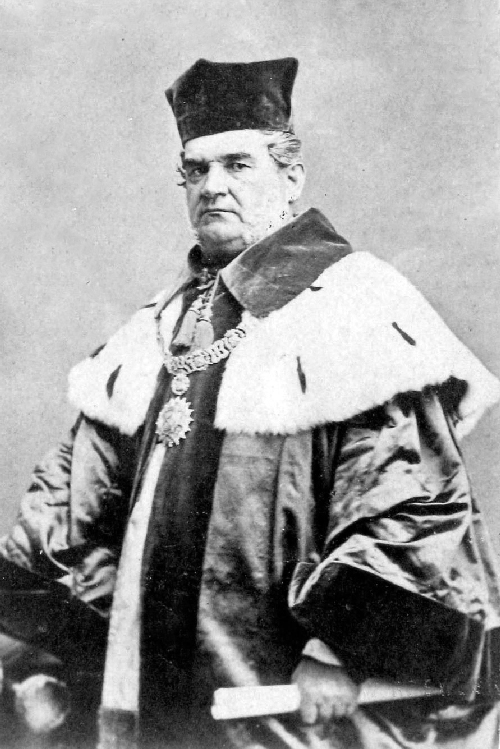Post by Bonobo on Dec 16, 2018 21:52:26 GMT 1
Many of them, a few really meritorious.
nowahistoria.interia.pl/drogi-do-wolnosci/news-jozef-dietl-awansowal-krakow,nId,2624805
Józef Dietl (24 January 1804 in Podbuże near Sambor – 18 January 1878 in Kraków) was an Austrian-Polish physician born to an Austrian father and Polish mother. He studied medicine in Lviv and Vienna. He was a pioneer in balneology, and a professor of Jagiellonian University, elected as its rector in 1861. Dietl described the kidney ailment known as "Dietl’s Crisis" as well as its treatment.
From 1866 to 1874, Dietl was mayor of the city of Kraków.
ceju.online/baza/tmp/man/man_954/ceju_954.pdf
A year later, in 1866, the Polish community finally saw the
long-awaited advent of Galician autonomy, and the City Council of
Cracow elected Dietl as the new mayor. His task was to restore the
ancient capital, once the seat of Polish kings, to its proper status.
The difficulties were immense. In a speech outlining his program,
Dietl said, “our illustrious past is over, our present is dispiriting, but
ours is the future if we grasp it, if we work for it unstintingly, with
wisdom and with perseverance.”
Joseph Dietl’s 8 years as mayor of Cracow were distin-
guished by highly enterprising and successful activity bringing
order to the neglected city in the sectors of hygiene, technical
infrastructure and fire safety, municipal finances, schools, and
protection of historical relics. He reorganized the City Council
and worked on improving tradesmen’s conditions. He streamlined
the city administration, increased its income and assets, and was
instrumental in the development of schooling. He initiated the
conservation of historical buildings and relics, among them the
famous Cloth Halls. He was also involved in the organization of
a fire brigade. During Dietl’s term in office, the Cracow Scientific
Society was transformed into the Academy of Science (1873) and
a number of societies for science and the arts were revived [1-4,
7, 11, 16, 17].
Monuments and commemorative plates and medals are the
means by which Cracow and other Polish cities including health
resorts keep alive the memory of Joseph Dietl and his numerous
accomplishments. These tributes are but a small reminder of how
much is owed to this great man.
He is remembered as a great doctor and educator, outstanding
scientist, deservedly acclaimed political and social activist, relent-
less fighter for restoration of national character and education
reform in Cracow and in Galicia. His life, works, his scientific and
political activity are model examples of the cultural relationship
between Middle – and Eastern Europe [1, 3-5, 7,





Dietel Street

nowahistoria.interia.pl/drogi-do-wolnosci/news-jozef-dietl-awansowal-krakow,nId,2624805
Józef Dietl (24 January 1804 in Podbuże near Sambor – 18 January 1878 in Kraków) was an Austrian-Polish physician born to an Austrian father and Polish mother. He studied medicine in Lviv and Vienna. He was a pioneer in balneology, and a professor of Jagiellonian University, elected as its rector in 1861. Dietl described the kidney ailment known as "Dietl’s Crisis" as well as its treatment.
From 1866 to 1874, Dietl was mayor of the city of Kraków.
ceju.online/baza/tmp/man/man_954/ceju_954.pdf
A year later, in 1866, the Polish community finally saw the
long-awaited advent of Galician autonomy, and the City Council of
Cracow elected Dietl as the new mayor. His task was to restore the
ancient capital, once the seat of Polish kings, to its proper status.
The difficulties were immense. In a speech outlining his program,
Dietl said, “our illustrious past is over, our present is dispiriting, but
ours is the future if we grasp it, if we work for it unstintingly, with
wisdom and with perseverance.”
Joseph Dietl’s 8 years as mayor of Cracow were distin-
guished by highly enterprising and successful activity bringing
order to the neglected city in the sectors of hygiene, technical
infrastructure and fire safety, municipal finances, schools, and
protection of historical relics. He reorganized the City Council
and worked on improving tradesmen’s conditions. He streamlined
the city administration, increased its income and assets, and was
instrumental in the development of schooling. He initiated the
conservation of historical buildings and relics, among them the
famous Cloth Halls. He was also involved in the organization of
a fire brigade. During Dietl’s term in office, the Cracow Scientific
Society was transformed into the Academy of Science (1873) and
a number of societies for science and the arts were revived [1-4,
7, 11, 16, 17].
Monuments and commemorative plates and medals are the
means by which Cracow and other Polish cities including health
resorts keep alive the memory of Joseph Dietl and his numerous
accomplishments. These tributes are but a small reminder of how
much is owed to this great man.
He is remembered as a great doctor and educator, outstanding
scientist, deservedly acclaimed political and social activist, relent-
less fighter for restoration of national character and education
reform in Cracow and in Galicia. His life, works, his scientific and
political activity are model examples of the cultural relationship
between Middle – and Eastern Europe [1, 3-5, 7,





Dietel Street







